Here's What You Need to Know Know About La Vuelta Feminina

"Hearst Magazines and Yahoo may earn commission or revenue on some items through these links."
La Vuelta Femenina runs from Monday, May 1st to Sunday, May 7, 2023, and is one of the biggest events on the women’s calendar. In other words, there will be a lot to watch. Here are our top 5 things to know in order to fully appreciate all that’s about to go down in Spain next week.
History
The race was created in 2015 and originally coincided with the final stage of La Vuelta. In its first iteration — for the first three years — it was called the Ceratizit Challenge or the Madrid Challenge, and was held all in one day, within the city center, and featured short races that sprinters excelled at.
In 2018 the race expanded beyond Spain’s capital and was spread out over a weekend. And in 2020 the race ventured beyond Madrid into Castilla-la Mancha, and added enough racing to fill three days.
By 2021, the race added another stage to include mountains starting from the Manzaneda Ski Resort in the Province of Ourense. And this year we jump yet again, from five to seven stages. At last, we have ourselves an epic week-long race with all kinds of terrain, from the south of Spain to the north.
The Course
703.3km in total. We open with a team time trial, followed by a series of flat and rolling stages, then into some challenging climbing before the Covadonga finale.
The longest day comes in stage three, with 158 km. from Elche de la Sierra to La Roda. While this flat stage will favor the sprinters, all riders must be strong through the almost inevitable whipping winds in this region.
Stage five will be exciting for the climbers. Navafría comes almost exactly halfway through the 129.5 km. route. And then riders must overcome a 5 km. climb to reach their summit finish. But don’t worry, that’s not the end of the climbing. The seventh and final stage comes with likely the most exciting elevation gain — Lagos de Covadonga. A 12.5 km. climb at an average of 6.9% grade, into the finish line.
Who to Watch
With 23 teams (according to the official website), there are so many riders who will undoubtedly do well in this stage race, so it’s hard to pick an overall favorite, although we did try. We’re going to be glued to:
Demi Vollering (SD Worx), who just can’t stop winning. Most recently, she won Liège–Bastogne–Liège
Annemiek van Vleuten (Movistar), the defending champion who will certainly shine on all things climby
Kasia Niewiadoma (Canyon-SRAM), who came in third at Tour de France Femmes last year
Gaia Realini (Trek-Segafredo), who will has seen huge success in the last year
Lizzie Deignan (Trek-Segafredo), just seven months out from giving birth!
How to Watch
Daily coverage of La Vuelta Femenina will be streamed live in the U.S. on Peacock. The streaming service will also replay each stage for those who can’t watch live. Stage 1 starts at 6:30 a.m. EST on Monday, May 1,2023.
Why to Watch
It’s the third longest women’s race behind the Tour de France Femmes and Giro d’Italia Donne. All of the top riders will be there to battle each day. And because of the beauty of the varied terrain, it will make you want to travel to Spain and ride much of the route on your own, probably at a slower pace. What more can you ask for?
You Might Also Like
